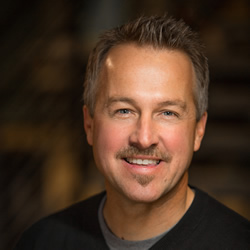Back in junior high, I had what I call my first “I-C-N-U” conversation.
I was at a summer camp in Indiana, and Dennis Gamauf was there. If you aren’t into basketball, you probably don’t know he is. But I did. Back then I lived and died basketball, and I knew that Dennis had played in the Big 10 conference for Purdue. All week, I was just in awe of this guy.
I remember one day we were leaving the softball field and suddenly, I just felt this big hand on my shoulder. I turned around and it was Dennis. He said a few things about basketball and then he said, “Dave, I see in you someone who could be a really good leader.”
I remember thinking, Wow! Dennis Gamauf sees that in me?
It happened years ago, and yet I still remember that “I-C-N-U” conversation. Dennis gave me permission to see something in me I hadn’t seen.
Seeing the Leadership Potential in Others
That’s what the second practice in moving from hero to hero maker is all about. You begin to take the focus off your leadership and begin to see all the leadership potential God has put around you. I see what God can do through my own leadership shifts to I see what God can do through others, and I let them know what I see in them. It’s a shift in seeing: “I see this gift in you,” and “I see God at work in you when you . . .”
We find the same permission-giving throughout the life of Jesus.
When Jesus says to some a group of ragtag working-class fishermen, “Come, follow me … and I will send you out to fish for people” (Matt. 4:19), He basically tells them, “I see in you what you don’t see in yourselves.” Here’s this rabbi saying, “I think you could be a really good leader.” They never expected a rabbi to see them worth teaching and leading. But Jesus saw in them a group that could change the world.
Think about what he did with Peter: “Hey Rock, on you I’m going to build my church. This movement of love is going to start with you.”
And then, ultimately, He gives us permission, saying, “My Spirit is going to come, and you’re going to be My witnesses to the ends of the earth” (Acts 1:8). Essentially, He says to us, “I see in you the potential for leading a movement that will bring My people to me both on earth and in paradise.”
Leading With ‘Yes’
When you start to see the potential in the people around you, you begin to lead with a “yes” and give them permission to fully engage in the mission. The one thing every hero maker possesses that everyone around him or her needs is permission, which needs to come in the form of a yes.
A recent study called “Growing Young” reported that the more you give millennials permission—handing them the keys of everything from the church facility to the soda machine by the youth room —the more they’ll thrive.
If you want to multiply leaders who in turn multiply leaders, you must lead with a yes. If the people around you cannot get a yes, they will never discover the dream God has for their lives or reach their redemptive potential. If your followers can’t get permission from you with a yes, they will never be engaged in the mission.
Six Levels for Giving Permission
Admittedly, saying yes, especially at first, is hard. There are all sorts of fears that keep us from leading with a bias to yes (We discuss these fears thoroughly in the new book Hero Maker). Below are six progressive levels to help you move toward saying yes and giving permission:
Level 1: Watch what I do, and then let’s talk about it.
Level 2: Let’s together figure out a plan.
Level 3: Propose a plan for what I should do, and let’s talk about it.
Level 4: Let me know your plan, but wait for my feedback.
Level 5: You should handle it completely, and then let me know what you did.
Level 6: You should handle it completely, and there is no need to report back to me.
This approach helps you to frame ministry around the word yes. If you are going to be a permission giver, you need to develop a yes reflex.
Recently, in an interview for our “Hero Maker” podcast, pastor, author and former NFL player Derwin Gray joined us to talk about the influencers in his life who saw greatness in him and led with a bias to yes. Now he models that same permission-giving with his church in South Carolina. Eighty to 90 percent of Transformation Church’s staff was at one time part of the congregation.
“We believe in multiplication and replication within the body,” Derwin said, “but you have to see that in people, say it, encourage it, and then equip them for what God wants to do in and through them. As a leader, you have to ask: ‘How do I give people permission to dream and then pursue that dream?’”
If you want to learn how to become a better permission giver and maximize your impact on the kingdom of God, then check out our 2018 Hero Maker Conference. It will feature 175+ speakers, 200 workshops, 9+ tracks, and 5,000 church planting leaders in sunny Orlando, Florida. Don’t miss the largest gathering of church planting leaders in the world.
Dave Ferguson serves as president of Exponential while leading Community Christian Church and overseeing the NewThing Network. His new book (with Warren Bird), Hero Maker: 5 Essential Practices for Leaders to Multiply Leaders releases February 2018. Visit exponential.org/2018 to learn more about hero making at the the upcoming Exponential 2018 conference in Orlando (Feb. 26-March 1).







